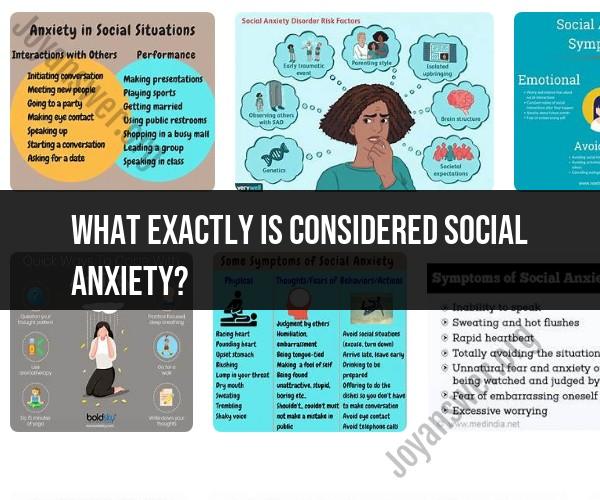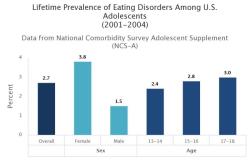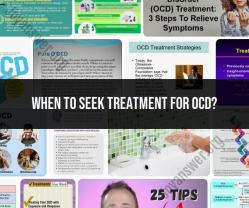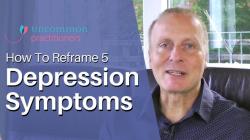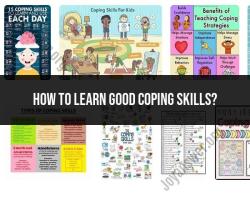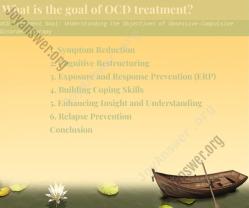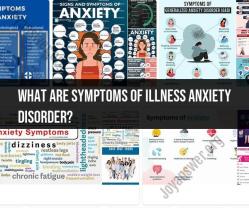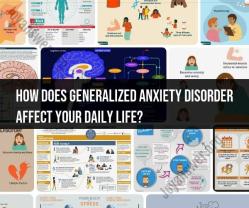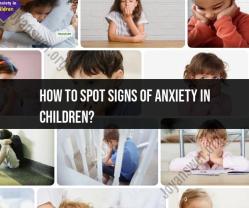What exactly is considered social anxiety?
Social anxiety, also known as social anxiety disorder (SAD) or social phobia, is a mental health condition characterized by a persistent and overwhelming fear of social or performance situations in which the individual may be exposed to scrutiny, judgment, or evaluation by others. People with social anxiety often experience intense anxiety and distress in various social situations, which can significantly impact their daily life and functioning.
Key characteristics of social anxiety include:
Fear of Negative Evaluation: Individuals with social anxiety are typically afraid of being judged, criticized, or rejected by others. They may fear that others will view them negatively, and this fear can be out of proportion to the situation.
Avoidance Behavior: To reduce anxiety, individuals with social anxiety often avoid situations where they might be the center of attention, such as public speaking, dating, attending parties or gatherings, or even making phone calls. This avoidance can limit their personal and professional lives.
Physical Symptoms: Social anxiety can manifest physically, with symptoms like blushing, sweating, trembling, a racing heart, dry mouth, and nausea. These physical symptoms can be distressing and embarrassing.
Rumination: Individuals with social anxiety may ruminate excessively about past social interactions, worrying about what they said or did, and fearing that they made a negative impression on others.
Performance Anxiety: Some people with social anxiety experience intense performance anxiety, particularly when they are in situations where they need to perform or speak in front of others. This can be a significant challenge in academic or professional settings.
Interpersonal Challenges: Social anxiety can lead to difficulties in forming and maintaining relationships. It may affect one's ability to express themselves, connect with others, or participate in social activities.
It's important to note that social anxiety is a recognized psychiatric disorder, and it can be differentiated from normal shyness or introversion. It often begins in adolescence or early adulthood and can persist if left untreated. However, the good news is that social anxiety is a treatable condition. Cognitive-behavioral therapy (CBT) and, in some cases, medication, can be effective in managing and alleviating the symptoms of social anxiety.
If you or someone you know is experiencing social anxiety that significantly impairs daily life or functioning, it's advisable to seek help from a mental health professional. They can provide a proper diagnosis and develop a treatment plan tailored to the individual's specific needs.
What is social anxiety, and what does it entail?
Social anxiety, also known as social phobia, is a mental health condition that involves a significant amount of fear or anxiety in social situations. People with social anxiety may worry about being judged, negatively evaluated, or rejected by others. This can lead to avoidance of social situations, which can have a negative impact on work, school, and relationships.
How to recognize the signs and symptoms of social anxiety disorder?
Common signs and symptoms of social anxiety disorder include:
- Feeling anxious or fearful in social situations
- Avoiding social situations
- Worrying about being judged or evaluated by others
- Feeling self-conscious or embarrassed in social situations
- Having physical symptoms such as blushing, sweating, trembling, or a rapid heart rate in social situations
Can you provide insights into the psychological and emotional aspects of social anxiety?
Social anxiety can have a significant impact on a person's psychology and emotions. People with social anxiety may experience negative thoughts about themselves and their abilities, such as "I'm not good enough" or "I'm going to make a fool of myself." They may also feel isolated and lonely, as they may avoid social situations and relationships.
Social anxiety can also lead to other mental health problems, such as depression and substance abuse.
What are the potential causes and triggers of social anxiety?
The exact cause of social anxiety is unknown, but it is thought to be a combination of genetic and environmental factors. Some potential causes and triggers of social anxiety include:
- Genetics: Social anxiety can run in families, so it is possible that there is a genetic component to the disorder.
- Brain chemistry: Some studies suggest that people with social anxiety may have differences in the way their brains process information and emotions.
- Life experiences: Negative or traumatic life experiences, such as bullying, teasing, or public humiliation, can increase the risk of developing social anxiety.
- Other mental health conditions: Social anxiety can co-occur with other mental health conditions, such as depression, anxiety disorders, and personality disorders.
How to seek help or support for managing social anxiety effectively?
There are a number of ways to seek help or support for managing social anxiety effectively. Some options include:
- Therapy: Therapy can be very helpful for overcoming social anxiety. A therapist can help you to identify your triggers, challenge your negative thoughts, and develop coping mechanisms.
- Support groups: Support groups can provide a safe and supportive environment for people to talk about their social anxiety and learn from each other.
- Medication: Medication can be used to treat social anxiety, but it is important to note that it is not a cure. Medication can help to reduce the symptoms of social anxiety, but it is important to use it in conjunction with therapy.
If you are struggling with social anxiety, it is important to seek help from a qualified mental health professional. With the right treatment, you can manage your social anxiety and live a full and productive life.
